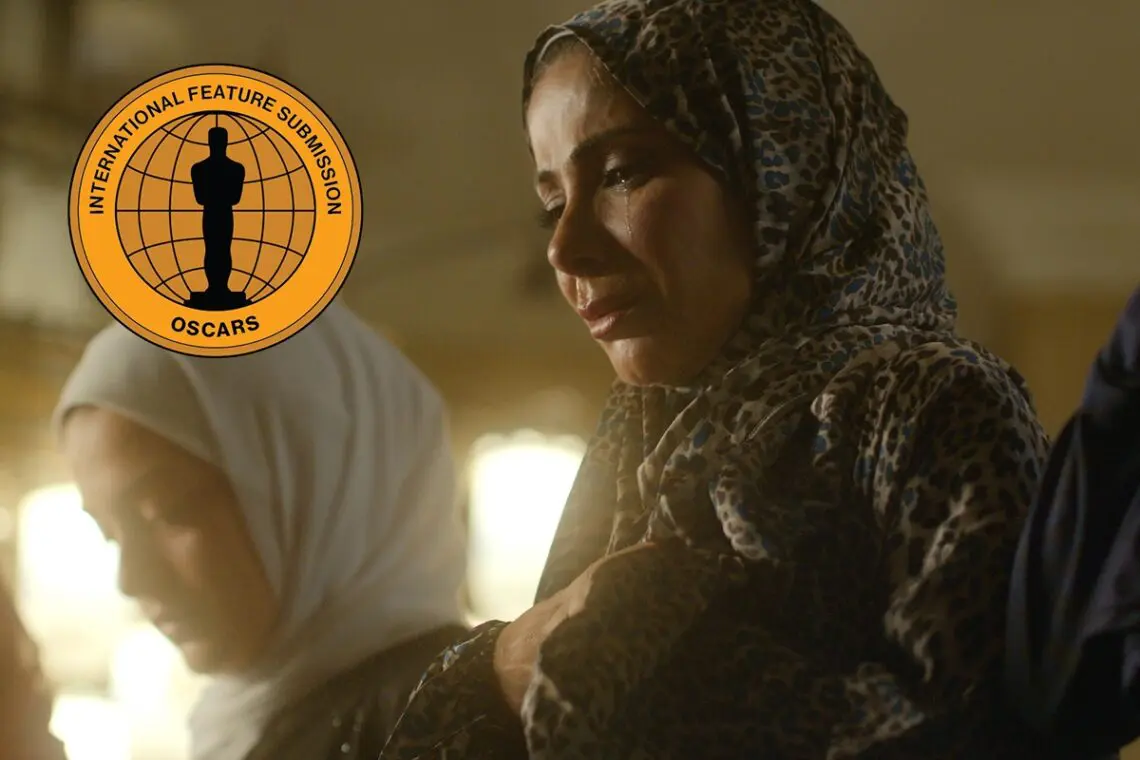There’s a stilted, soap opera quality to Hany Khalifa’s “Flight 404,” Egypt’s submission to the Academy Awards. It never quite transcends these visual and narrative trappings, but its tale of a woman escaping her past, en route to her Mecca pilgrimage, is led by a deeply layered performance from Mona Zaki. While the actress brings nuance and fearsome emotional commitment to her role, the film is often restrained by drama so frustratingly opaque that it veers into comical territory.
The diligent Ghada (Zaki) works at an upscale real estate company in Cairo, and makes sure to take breaks for her fajr, or daily Islamic prayer, which doesn’t appear to be a priority for most people around her. However, “Flight 404” is far from the conservative screed such a backdrop might suggest. The plot is set in motion when Ghada’s noon prayers are interrupted by a phone call, detailing her estranged mother extorting a young relative for cash, a wonderfully symbolic occurrence of the past interfering with her present piety — a running theme.
Ghada, the film slowly unveils, was once a high-end escort, though the film dances around this verbiage. Perhaps this is to get around Egyptian cinema’s censorious norms, which lends credence to Khalifa’s initially hazy approach to details and relationships, as Ghada prepares to embark on her hajj to Mecca. However, it isn’t long before every aspect of the movie begins to feel similarly scattered and indistinct. Ghada’s mother shows up at her workplace to shake her down, and is hit by a car and subsequently hospitalized, though she’s seldom mentioned again.
Popular on Variety Granted, this hospitalization appears to set a domino effect in motion. The cost leads Ghada to track down old connections from her past life, from madams to once-regular johns, in order to facilitate land deals, or make good on old favors, or pay find money for her Mecca trio, or … well, the list is long. The revolving door of supporting characters hint at Ghada’s past through expository reminiscing, but these scenes seldom shed light on the present, on what she’s actually trying to achieve (logistically or emotionally) or how returning to her past changes or challenges her beyond superficial notions.
The film’s key turn involves an anonymous, high-rolling prospective client spotting Ghada back in one of her old haunts and requesting her services, even though she’s left her old career behind in favor of a veil and a more straightforward religious path. The question of whether or not she’ll return to her old self goes hand in hand with the degree to which the men (and sometimes women) around her will even permit her to live life on her new terms, pointing toward a social fabric that keeps her emotionally entrapped. What’s more, the movie’s frank, casual depiction of her friends and former colleagues ensures that Ghada never becomes a proxy for regressive, anti-sexwork views, since her choices are framed as hers, and hers alone — and one of many possible options. However, what Ghada is actually a proxy for is often vague as well.
The symbolism associated with her prayers comes up from time to time, as when she washes her feet (a common pre-prayer cleansing) in the fancy, modern bathroom sink of a former associate, whose expensive home isn’t equipped for such rituals. No one else around her seems particularly concerned with traditions to which she now clings as a means to leave her past behind. However, as understated as some of these gestures toward theme can be, the movie’s actual drama unfolds in bizarre ways, usually over one-sided cellphone calls, during which Zaki is tasked with relaying information to the audience while reacting to it in the moment. But while doing this once is a neat trick, and twice is pushing it, “Flight 404” keeps returning to the same shallow well of conveying its major turns and plot beats off-screen.
Zaki is remarkable at what she does, performing the herculean task of imbuing Ghada with sense of lived reality and spiritual dilemma. She wraps all of this in a rankled, risible character who feels the world is against her, even though the film’s aesthetic decisions — or lack thereof — seem intent on undercutting her performance at every turn.
The who’s-who of “Flight 404” is especially irksome to keep track of, given the movie’s refusal to move beyond its noncommittal soap opera trappings, where dialogue takes precedence, and explanation (rather than rumination) is prioritized within that dialogue. It’s overlit to the point of plainness, robbing its few genuinely dramatic reveals of much impact. Instead, the onus for building intrigue falls on disastrously conceived sequences of characters shouting plot reveals about their pasts at one another with machine-gun pacing, ensuring that key elements of the movie’s premise are disguised for the majority of its runtime, before being clunkily exposed and never mentioned again.
In theory, the tale of a flawed dynamic woman denied the very human concept of change and metamorphosis is potent dramatic fodder, and Zaki’s approach yields remarkable moments in isolation. However, when viewed in sequence, little of “Flight 404” lives up to this idea.

 Italian
Italian







